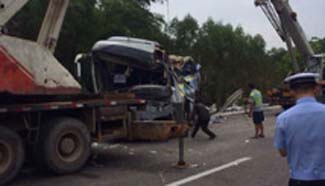HOUSTON, Aug. 28 (Xinhua) -- As classes started in the past week amid a new law allowing concealed handguns on Texas campuses, there are signs that faculty, students and residents are not comfortable with Texas being the eighth U.S. state to enact such legislation.
On June 13, 2015, state Republican governor Greg Abbott signed campus carry and open carry into law, allowing Texans aged above 21 years at all public universities to carry handguns in classrooms, buildings and dorms starting from on Aug. 1, 2016.
The law has sparked opposition from faculty and divided the state, which has allowed licensed concealed handguns in public since 1995.
Three University of Texas at Austin professors have filed lawsuits against the state and there have been three retirements by faculty members of major public universities following the new law, said Chuck Hempstead, executive director for the Texas Association of College Teachers (TACT).
"We've seen about three retirements at University of Texas at Austin and one at Texas A&M in College Station citing Senate Bill 11 on guns' open carry," Hempstead said.
Hempstead said that the TACT will tabulate the results of its current survey of faculty associated with universities mandated to adopt SB11's provisions. Based on the survey's returns so far, more than half the university professors in Texas are unhappy with the idea of teaching students concealing guns.
"Of the more than 300 responses thus far, a sampling looks like more than half list guns on campus when asked what two legislative issues do you find most important to Texas faculty?" Hempstead said in a recent exclusive interview with Xinhua.
Since the Texas Legislature's enactment of SB11, Hempstead said the questions now are a matter of public universities nailing down details where they have leeway.
"The issue now is whether faculty should be able to prohibit, or even request banning, guns in their classrooms, just as some schools have permitted them to prohibit them from their offices," Hempstead said.
The law already restricts guns from sports arenas and on-campus residential halls. Above all, he said, the goal of educators during these negotiations mirrors that of the students themselves and their parents: "(Keeping) students' health, safety, and education the number one priorities at universities."
According to a July 11 Texas Tribune, the three UT-Austin professors filed lawsuit asking that a federal judge issue an injunction to prevent campus concealed carry from taking effect Aug. 1 at four-year universities, as two-year community colleges are not scheduled to implement the law until August 2017.
Unfortunately, a U.S. federal judge rejected on Monday the demand by three professors of the University of Texas at Austin to keep guns out of classrooms.
The three professors, Dr. Jennifer Lynn Glass, Dr. Lisa Moore and Dr. Mia Carter, were seeking the option of maintaining their academic classrooms as gun-free zones when classes started again on Aug. 24, but U.S. District Judge Lee Yeakel ruled that neither lawmakers nor university regents overstepped their power in choosing where concealed firearms could be allowed on campus.
Referring to the campus carry law as "overly solicitous" and "dangerously-experimental," the three professors pointed to more than 20 shootings on college campuses nationwide in 2015. They also cited the UT Tower shooting in 1966, which killed 16 people, as a reason to ban guns from campus.
In response, Texas Attorney General Ken Paxton said that there was simply no legal justification to deny licensed, law-abiding citizens on campus the same measure of personal protection they were entitled to elsewhere in Texas.
To prepare for implementation of the law, the website of the University of Texas at Austin states that the university's leadership has been working closely with students, faculty and staff members from across campus to implement the law as smoothly as possible.
"We have heard and understand the concerns raised by many members of the campus community," the post states. "We are working to address those concerns within the parameters of the law and to answer the many questions that have been raised about the new law."
According to the university's new Handbook of Operating Procedures, concealed carry of handguns by permit holders is generally allowed in outdoor areas, as well as buildings and spaces that are accessible to the public, including classrooms. Faculty members are not allowed to ban guns in classrooms, but may give oral notice that they will forbid concealed carry of handguns in their office spaces.
On Wednesday, students at the University of Texas at Austin launched a massive protest against the state campus carry laws.
In 2013, 19 U.S. states proposed the legislation to allow concealed carry of handguns on campus. Also that year, five states introduced laws to ban concealed weapons on campuses, but none of those bills passed. The following year, 14 states introduced the campus-carry law.
At Texas Southern University (TSU)in Houston, where there were three gun-related shootings on or near the campus last year, the university President Austin Lane's web page states that a committee of the Office of General Counsel, TSU Public Safety and faculty, staff and students developed designated "gun-free zones" that include centers for students, health and counseling and parts or all of the staff and faculty offices, science, general services and central operational plant buildings.
Overall, there have been 159 school shootings -- or an average of nearly one shooting every week -- since the tragic Sandy Hook Elementary School massacre in 2012 Connecticut left 27 dead, mostly 5-and 6-year-olds.
Meanwhile, some voiced support for the law, believing that it will make campuses safer.
Michael Newbern, assistant public relations director for Students for Concealed Carry, said in a phone interview with Xinhua that more guns in the hands of responsible, licensed-to-carry students will increase campus safety.
"We don't believe that concealed handguns are making us less safe; just the opposite," Newbern said.
"By restricting the tools needed to fight back, all you're doing is telling the bad guys we've made it safer for you because your victims can't fight back. We fundamentally believe (concealed carry) by those who've met all the state requirements for a gun license in their state will reduce shootings on campus."
Others believed there are better ways to secure campuses than allowing carrying concealed gunhands.
Just north of Houston, Splendora Independent School District kindergarten teacher Marianne Chase told Xinhua that she doesn't want guns in any school. She favored more metal detectors and a mandate for visitors to sign in at administrative offices.
"I think making people walk through the metal detector would be an added security precaution," said Chase, 57. "On college campuses, they would have to install one at the entrance to every building and the staff to monitor it. That, along with increased police visibility -- especially at night -- would make students feel safer."
Social worker Dianne Anderson, 61, who has worked in schools and low-income communities, said that the United States needs to accurately determine why it has experienced so many multiple shootings in schools and public places in the 21st century so far.
To correctly identify the problem, she said, requires empirical studies complete with polls, societal and individual histories and deep investigations into each shooting.
"Multiple variables -- social-economics, gender, education, race, prior histories of injustices -- must be closely examined. There exists no one-size-fits-all answer to this extremely complex question," Anderson said.
Anderson also blamed the right-wing members of the U.S. Congress for its failure to enact meaningful gun safety laws and for its blocking proposed gun control legislation.
"No new gun laws are allowed to pass," Anderson said. "It could be the National Rifle Association (NRA) lobby has filled the pockets of the politicians with so much money, benefits and good times that they don't want to vote responsibly on gun bills."
Susan Stiteler, former Houston teacher of math and art in elementary schools, also believed that the NRA's powerful lobbying efforts have muted the average citizen's voice when it comes to gun control.
"As long as politicians are lobbied by the NRA to allow guns to be pervasive in our society, students will continue to be killed," said Stiteler, 49.
"Countries with strict gun control laws simply do not have these issues we have with gun violence. Until guns are taken out of the public's hands, this problem will remain."
Removal of guns from all but law enforcement will never happen, Stiteler said, because the NRA spends millions of dollars to curry favor with politicians who enact legislation opposed to any gun restrictions.
"The ultimate answer is to remove money from politics," Stiteler said. "I do not see this happening anytime soon."
Coming on top of diverse messages from the gun-control activists and the gun-carry enthusiasts is a 2015 study by Texas A&M University concluding that people are not driven by crime to get concealed-carry permits, and neither do such permits cause any increase or decrease in crime.
This study flies in the face of Stanford Law School's findings in 2013 that right-to-carry laws result in an increase in aggravated assault, and potentially -- though possibly because of other contributing factors -- upswings in other crime categories such as rape, robbery and murder.
On the opposite end of the spectrum from the NRA, the website of the Brady Campaign to Prevent Gun Violence states that annually, about 100,000 people are victims of gun violence in the United States and of these, more than 32,000 die. That averages roughly 90 people dead, two-thirds of them from suicide, each day.
The campaign's website also calls for background checks before all gun sales, reducing the 40 percent of sales from dealers who ask no questions of purchasers, as well as 90 percent of crime guns currently traced to the same 5 percent of U.S. gun dealers.
"To combat these unacceptable numbers, we have an ambitious goal to cut gun deaths in half by 2025," the Brady Campaign's website states. "We must address this issue through policy, legal action, and public health and safety."
In an interview with Xinhua, John R. Lott, Jr., Crime Prevention Research Center founder and president, suggested that gun restriction is not the way to stop gun violence.
Considered one of the nation's top opponents to restrictions on carrying firearms, Lott is also author of several pro-gun books, holder of a doctorate in economics, former professor at Yale and other universities and a Fox News columnist.
"Why do people commit these mass public shootings? They do it to get media attention. They want to commit suicide, but they want to do it in a way that will get them attention and they know that the more people they kill, the more media attention that they will receive," Lott said.
He cited crime research studies that show the trend continues of Americans feeling that guns make them safer, and also that U.S. residents prefer living in neighborhoods where residents are fortified with guns.
"I think that these polls go a long way to explaining why there is opposition to gun control laws that mainly disarm law-abiding citizens who obey the laws," Lott said.
Lott recently provided testimony in Michigan's senate judiciary hearings on allowing licensed holders to carry in gun-free zones, which he called a magnate for murderers.
"These killers seek out targets that they don't believe can defend themselves so that they can kill as many people as possible. The faster that some one with a gun can arrive on the scene to stop the killer, the faster it is stopped."
Chase said that she doesn't want to work in a school where teachers -- much less, students -- can carry concealed weapons, and she wonders if she might someday be required by Texas lawmakers to learn how to shoot a gun in addition to teaching children letters, numbers and colors.
In Texas, she said, there are already too many guns in the hands of the wrong people, and that carrying on campus has a high probability of further arming criminals or mentally ill students who are likely to take firearms from less gun-savvy teachers and students.
"By the logic that says carrying loaded weapons will make you safer, then it follows that everybody with bigger, faster guns -- like automatic,rapid-fire guns -- will make us all safer still. That's not a society I wish to live in."










